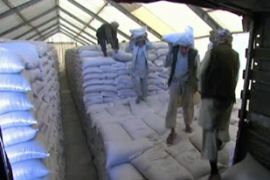Afghanistan seeks winter food aid
Inadequate supplies compounded by bitterly cold weather could spell death and destitution.

Two sacks of wheat were provided for each family.
Haji Shair Agha Hotak, from the Afghan agriculture department, said: “For every ten people we hand wheat to, here hundreds more should also get supplies.
“There are three million people in Herat province. We simply do not have enough food to feed them all.”
Rising food prices
Prices of food in local markets has soared in recent months, leading to hunger and consequential disease.
A local woman, collecting food aid from the WFP in Herat on a recent day, said: “I’m sick and this is the first time I have got any wheat. My children are hungry.
| Video | ||
|
|
“I was pushed and punched.”
Black marketeers are in the region attempting to persuade people, particularly the old and vulnerable, to sell their supplies of wheat.
Elderly locals are often left stranded after travelling to Herat town to receive aid but failing to have enough money to return home.
Chater said that dwindling food aid supplies are not reaching remote regions in Afghanistan and that the heavy annual winter snow will hamper distribution further.
Food shortages have been instigated by a drought which has depleted rivers around Herat.
The drought followed a brutal winter in 2007 in which hundreds of people died of hypothermia.
Walid Akbar Sarwary, of the Afghan Red Crescent, told Al Jazeera: “It is clear that Afghanistan is facing … a lot of problems regarding the shortage of food.”
Sarwary said that reports by the Afghan Red Crescent and other international agencies estimated that more than 5 million people face a lack of food this winter.
He said that the Afghan cabinet had been discussing the provision of food to citizens for months but that the level of need was very high.
Sarwary said that Afghanistan’s food output had dropped due to the drought, cultivation of the opium poppy and the continued conflict in the country internationally-led forces fighting insurgent groups.
